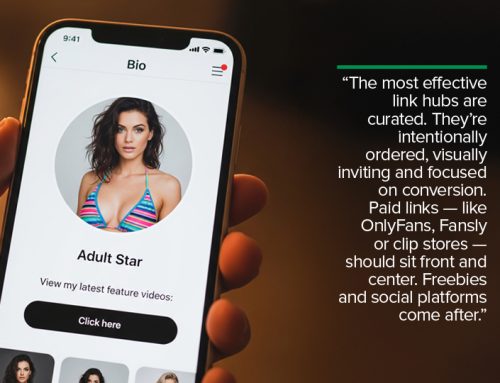Dealing with fans can often be a mixed bag for content creators. Most fans are friendly, respectful and willing to pay for your attention. However, along with the good comes the bad — in the form of the occasional hater, boundary crosser or freeloader.
I want to share some useful tips for how to handle those kinds of fans, and hopefully even get them back on track toward being positive members of your fan base. That way, everybody wins!
Setting clear boundaries and utilizing effective monetization methods can help you grow a fan base that is respectful, appreciative — and lucrative.
The Delicate Balance of Fan Relationships
Dealing with “problem” fans can be tricky. That’s because creator-fan interactions fall into a gray area, somewhere between parasocial relationships — like idolizing a pop star or movie actor — and real-life relationships, like you might have with a friend or romantic partner. Making sure fan interactions go smoothly therefore requires a delicate balance between creating meaningful connections and maintaining professionalism.
Some fans feel as if they know the “real” you, and don’t quite realize that this is your job. That makes it extra important to maintain boundaries. In particular, don’t share too much personal information. You want them to feel special — but not so special that they think you’re just a phone call away.
Those are the basics. With that foundation in place, let’s look at some of the tricky situations that can come up.
Haters and Trolls
Every now and then, a fan will behave completely inappropriately. Whether it happens in the DMs or during a live show, remember that it’s up to you to decide what you are willing to engage with and what you simply won’t tolerate. You can follow a zero-tolerance policy, or go with a “three strikes you’re out” approach where you inform fans when they’re close to being banned, giving them a chance to correct their behavior. You can also ban them and then charge a fee to lift the ban, provided they follow the rules going forward.
If you’re not sure which way to go, try talking to other creators about how they manage their space. Some creators have no problem telling a fan, “No thanks, I don’t deal with haters” and blocking them. Others are more patient. Ultimately, you have the power to set your personal limits and define the tone for your community dynamics.
Boundary Crossers
As mentioned, creator-fan interactions can be a gray area, especially since different creators set different limits. That makes it doubly important to establish clear boundaries in your own space. But even when you do, there will still be fans who need reminding when they cross the line.
We are not necessarily talking about trolls or haters here, though there is definitely overlap. Some of your most devoted fans might make inappropriate requests or take things a step too far. Once again, it is up to you how to respond.
They may ask you to make content you’re not comfortable with, or they may reference something from your past that you don’t want to discuss. They may make inappropriate comments about your body — like when some of Siri Dahl’s fans complained about her breast reduction surgery. She has been very public about how it improved her health, but also about some of the vitriol that supposed “fans” sent her way.
Establishing clear boundaries can also help you devise a comeback or even a prepared script to help you handle inappropriate comments and requests — whatever helps you shut it down. Sometimes offering an alternative works. For instance, if someone asks you to call them “baby boy” and you are not comfortable with that, you could say something like “Sorry, I won’t do that. But you can call me ‘Mommy.’” Other times you may need to be more firm.
Remember that it is always OK to say no to a fan, and to block anyone who crosses your boundaries and is disrespectful. You don’t need the grief and you don’t want their money!
Freeloaders
This is a big one. The avalanche of free porn online has skewed some fans’ expectations about what they are entitled to, turning them into freeloaders who feel they deserve more than you’re offering. They may respect your rules and boundaries, but not your need to make a living!
We’ve seen fans try everything, from asking for a new scene to get them to subscribe, to claiming, “I bought it on this other platform, but it was never delivered!” Pro tip: If you are on multiple platforms, keep track of where your content is, in case someone tries that line on you.
Once again, it comes down to boundaries. What content, if any, are you willing to give away for free? Remember who is in charge in this relationship. You decide what fans have to pay for and what they can get as a freebie, not the other way around.
Having a plan for how to handle freeloaders will make it easier for you to navigate these situations as they come up, and it starts with identifying them early on. Being able to recognize which fans will spend, and which fans won’t, enables you to prioritize your time. The simplest strategy is engaging a fan for tips early in your conversation. This should reveal fairly quickly whether they are willing to spend or not. A brief, friendly exchange is a good start, but if they turn down offers to sext or to unlock an inexpensive photo or voice note, move on. You can always revisit the fan later, in case they’re just between paychecks — but otherwise, don’t continue to pursue them.
Right in your welcome message, you can post guidelines such as “Feel free to ask me anything, but if you would like your messages to be answered right away, please include a tip, and it will become my top priority!” or “Opening Message Do’s and Don’ts. Do: Send a tip along with your DM! Messages sent with tips attached get pushed to the top of my inbox, so I’ll see them first and you’ll get a quicker response. Don’t: Just say ‘Hi’ or ‘Sup,’ because I am not a booty call. You will be ignored.” This tells fans, kindly but clearly, that you’re here to work and are not available for chit chat. Remember, you’re not their therapist or girlfriend, so don’t let them treat you as such!
Positive reinforcement is especially helpful. Show appreciation to fans who spend. Kind gestures go a long way. Keep track of who is respectful and what content they prefer. You can even keep notes on a fan’s birthday or their pet’s name, and use this information for simple gestures like offering a bundle of JOI content at a “birthday discount rate.” Also, keeping notes on who doesn’t spend, who complains, and who disappears and reappears will make it easier for you to focus on consistent fans who do spend. They’re the ones who count!
Finally, you can design a subscription model that rewards spending, or create a special fan club that is invite-only, where fans who spend significantly more can receive special attention. Think of it like a tiered subscription on a mainstream platform: the free version has ads, paid is ad-free, and premium is ad-free and includes early access to new releases. This is an easy way to separate the whales from the sardines.
Dealing with fan interactions in a positive and profitable way requires assertiveness, strategy and willingness to show appreciation. Setting clear boundaries and utilizing effective monetization methods can help you grow a fan base that is respectful, appreciative — and lucrative.




